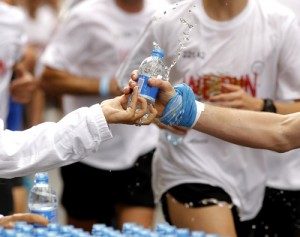 One of the most frequent of the FAQ’s that we receive is why use PET-1 (non-PBA plastic) for Watt-Ahh? The short answer is for safety, sanitation and product integrity.
One of the most frequent of the FAQ’s that we receive is why use PET-1 (non-PBA plastic) for Watt-Ahh? The short answer is for safety, sanitation and product integrity.
History of Bottled Water
Several years ago, I was intrigued when someone asked me about the history of bottled water (pure, non-mineralized). My husband and I had often asked each other (years before AquaNew was ever conceived) who had the smarts to spur mass marketing of an essential commodity by making it mobile to keep up with our active lives? Bottled water, as we all well know, is either loved or hated and is one of the most controversial consumable products – being both a status symbol of health and an object of boycott.
More than forty years ago, perfect timing occurred between scientific discovery and the growing interest in exercise. In the early 1970s, a Du Pont Laboratory developed a new man-made plastic bottle (PET) that held water and was lighter in weight when compared to that of glass. About that same time, jogging was on the rise, and becoming immensely popular. Bottled water was the choice of joggers to provide convenient and constant hydration. “In turn, being seen with a bottle of water in your hand signified your commitment to healthy living,” said Dr. Emily Potter, one of the co-authors of the book, Plastic Water – The Social and Material Life of Bottled Water.
Safety and Sanitation
It is not advisable to take glass containers to either outdoor concerts or camping. Glass shatters when dropped. It also is heavier to ship across the country. Our online customers are correct that shipping Watt-Ahh in the lighter plastic bottles is expensive and they would not appreciate an even higher shipping cost. We also have concerns about cleaning reusable containers particularly college students who do not have access to dishwashers to fully sanitize such containers after each use.
Product Integrity
Watt-Ahh is electromagnetically charged water. A glass container over time will pull the electrons out of the water and deaden the electrical/active nature of Watt-Ahh. It is certainly fine to pour Watt-Ahh from its plastic bottle into a glass to drink; but we do not recommend for long-time storage.
Let’s keep recycling so bottled water can continue to be proclaimed as a status symbol for our own health as well as for the good environmental health of our own communities. Thank you!
